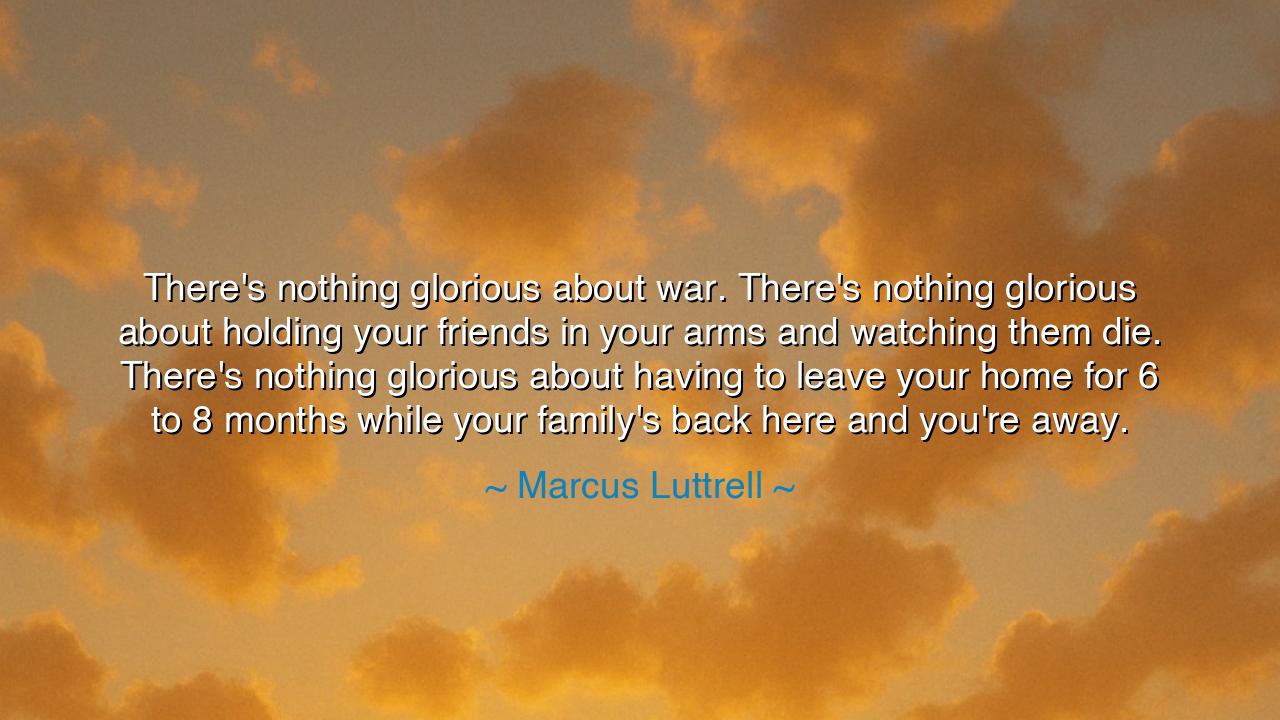
There's nothing glorious about war. There's nothing glorious
There's nothing glorious about war. There's nothing glorious about holding your friends in your arms and watching them die. There's nothing glorious about having to leave your home for 6 to 8 months while your family's back here and you're away.






In the days when men sought glory through battle, when the clash of steel and the roar of cannon were thought to shape destiny, the warrior Marcus Luttrell spoke words that broke through the illusion: “There’s nothing glorious about war. There’s nothing glorious about holding your friends in your arms and watching them die. There’s nothing glorious about having to leave your home for six to eight months while your family’s back here and you’re away.” These words, heavy with truth and sorrow, are not the musings of a poet far from the field, but the confession of one who has walked through the valley of death and returned marked by its shadow.
War, in the tales of old, was sung as noble—a dance of courage beneath banners and the shining sun. Yet Luttrell’s words tear away the gold leaf from this myth. He speaks as one who has seen glory transformed into grief, who has watched brave hearts fall silent and known the emptiness that follows. His is the voice of the veteran, the survivor, the witness—who reminds us that behind every tale of victory lies a grave, a widow, a child who waits and never sees a father return.
So let it be known: war is not glorious, though it may sometimes be necessary. It is the crucible in which men are tested, but not the altar upon which the soul should seek honor. To hold the dying body of a comrade is to understand the true cost of peace—the toll it takes not in gold, but in tears. Luttrell’s lament is not one of weakness, but of wisdom hard-earned: he does not curse duty, but the illusion that it is beautiful.
Consider the tale of Hector of Troy, the noble prince who fought not for conquest, but for the safety of his city and the love of his family. He knew he would die by Achilles’ hand, yet he went forth, not for glory, but for the duty that bound him. In his farewell to Andromache and their child, there is no triumph, only the sorrow of a man who knows that war steals the peace of both the living and the dead. Marcus Luttrell, in his time, spoke the same truth that Hector knew—that the warrior’s path is not gilded in honor, but soaked in sacrifice.
Yet from this darkness arises a light: the strength of the human spirit. For even when men are torn from their homes, when they endure the chaos of battle, there remains within them something unbreakable—the will to protect, the love that endures absence, the loyalty that binds brothers-in-arms beyond death. These, not the medals or songs, are the true glory of those who serve.
Let the listener understand this: the lesson is not to despise those who fight, but to see them clearly, not as heroes of fable, but as men and women who carry the weight of our peace upon their backs. To honor them is not to cheer for war, but to strive so that fewer must walk that road. The greatest tribute to the warrior is to build a world where war is no longer needed.
Therefore, take this wisdom into your heart: cherish peace, for it is the rarest and most fragile of blessings. Do not glorify battle from the safety of your home, but labor—each in your own way—to heal, to reconcile, to understand. Visit a veteran, listen to their story, comfort the lonely, and live with gratitude for the sacrifices made unseen.
For in the end, as Luttrell teaches, the true glory is not found in the clash of arms, but in the quiet act of love—the kind that endures across oceans and over graves, the kind that rebuilds what war has torn apart. That, and that alone, is the eternal victory worth striving for.






AAdministratorAdministrator
Welcome, honored guests. Please leave a comment, we will respond soon